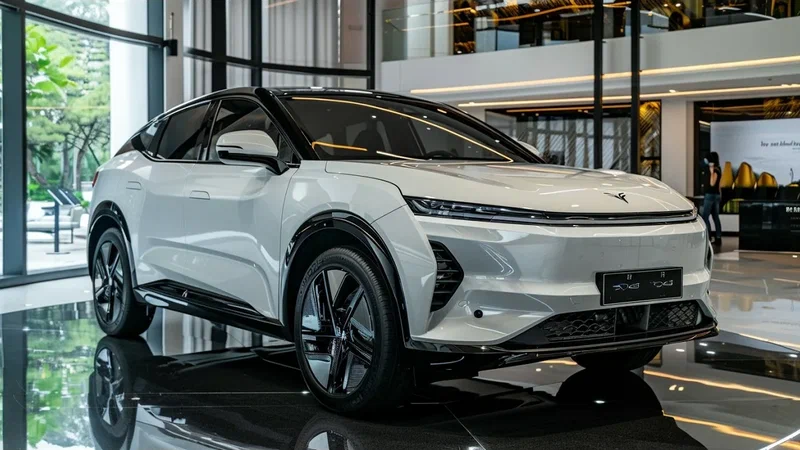The Changan AVATR 11 has caught the attention of automotive enthusiasts in Pakistan as a high-tech, all-electric compact SUV. With Huawei integration, a massive 116.79 kWh battery, and claims of over 668 km WLTP range, the AVATR 11 promises to challenge the status quo. But how realistic are these claims, and does the vehicle genuinely deliver value for Pakistani consumers? In this analysis, we critically examine the specs, technology, and market positioning of the AVATR 11.
Understanding the Changan AVATR 11 and Its Brand
For many readers, AVATR is a new name in the automotive world. It is a premium sub-brand under Changan, developed through a joint venture with Huawei and CATL, the global battery powerhouse. This partnership signals a focus on advanced technology integration and high-performance EV solutions, targeting the upper segment of the electric vehicle market.
While the branding sounds impressive, the challenge lies in establishing trust in a relatively unknown EV brand in Pakistan. Consumers may question the after-sales support, availability of parts, and local service infrastructure.
Performance and Battery: Are the Numbers Realistic?
The AVATR 11 boasts a 116.79 kWh battery pack, offering a claimed WLTP range of 668 km. On paper, this is remarkable for a compact SUV, easily covering trips like Lahore to Islamabad on a single charge. The base model delivers 317 hp and 396 Nm torque, while the top dual-motor variant achieves 539 hp and 687 Nm torque.
While these specs sound cutting-edge, real-world performance often differs. Factors such as Pakistani road conditions, climate, and charging infrastructure may reduce effective range. Additionally, the efficiency of a large battery in a compact SUV raises concerns about weight distribution, handling, and energy consumption during city driving.
Huawei Integration: Tech Marvel or Gimmick?
Huawei’s involvement is a major selling point. The AVATR 11 runs on HarmonyOS and is built on Huawei’s DriveONE iTRACK 800V platform. It also includes Level 3 ADAS, 12 laser radars, and 5G connectivity.
While this makes the SUV technologically advanced, it introduces several challenges. Dependence on Huawei’s ecosystem may limit compatibility with non-Huawei devices. Level 3 ADAS features require robust road infrastructure, which Pakistan currently lacks. High-tech systems increase maintenance complexity and repair costs. While Huawei integration offers futuristic features, local conditions might prevent users from fully benefiting from the system.
Design and Features: Premium or Practical?
The AVATR 11 adopts a sleek, futuristic design, aligning with modern Chinese EV aesthetics. While it appears premium, some users may find it over-stylized for everyday practicality, especially in Pakistani traffic and tight urban spaces.
Interior tech is heavily digital, emphasizing touchscreens and connected features. However, reliance on software-driven controls can be cumbersome for users accustomed to traditional automotive interfaces. The balance between cutting-edge tech and user-friendly experience will determine its success.
Pricing and Market Position: Competitive or Costly?
Although official pricing for Pakistan hasn’t been revealed, AVATR 11 is expected to target the upper segment of the EV market. While Chinese EVs are generally cheaper than German or Japanese counterparts, the advanced technology, battery capacity, and dual-motor performance suggest the vehicle won’t be cheap.
For Pakistani consumers, the high price could limit adoption to tech-savvy early adopters or premium buyers. Mass adoption will depend on government incentives, charging infrastructure, and local service availability.
Realistic Expectations for Pakistani Buyers
Pros:
-
Massive 116.79 kWh battery with long-range potential
-
Advanced Level 3 ADAS and Huawei tech integration
-
Dual-motor performance with high torque
-
Stylish and futuristic design appealing to early adopters
Cons:
-
Reliance on high-tech features may be impractical locally
-
Unknown after-sales service and parts availability
-
Price likely higher than typical Pakistani mid-range EVs
-
Real-world range may fall short due to climate and road conditions
In short, the AVATR 11 is technologically ambitious, but Pakistani consumers should temper expectations and prioritize infrastructure readiness and support before purchase.
Conclusion: Overhyped or Game-Changer?
The Changan AVATR 11 represents a bold move in Chinese EVs, combining massive battery packs, dual-motor performance, and deep Huawei integration. It could redefine compact electric SUVs in Pakistan if the infrastructure, pricing, and service network align with consumer needs.
However, the vehicle’s reliance on cutting-edge technology may pose challenges in everyday usability. Buyers should critically assess their needs, local EV readiness, and total cost of ownership before investing in this ambitious but complex electric SUV.
Read More: Haval Shocks Pakistan’s SUV Market



6 Comments
Pingback: BYD Sealion 6 Price in Pakistan 2025 – Review, Specs, Features
E aí, tudo certo? Me falaram da 6666betvip, mas não sei se vale a pena. Alguém já pegou algum bônus de boas-vindas por lá? Contem aí pra gente! Clica aqui: 6666betvip
Just browsing around and came across jiliph888. Anything good happening over there? Any promo codes you guys can share?
Is there a working link to 1xbet? Tried finding access. Is the service reliable or is link1xbet useless? Any updates?
Struggling to get into my Nova88 Maxbet account! Anyone else having trouble with the login? Website keeps redirecting. Let me know if you’ve got a workaround. Annoyed! nova88maxbetlogin
Hit’n’Spin Login… Sounds fun, right? Well, it is! Got in a few rounds and the interface is pretty smooth. Give it a spin yourself and see what you think! Best of luck! Find it here: hitnspinlogin